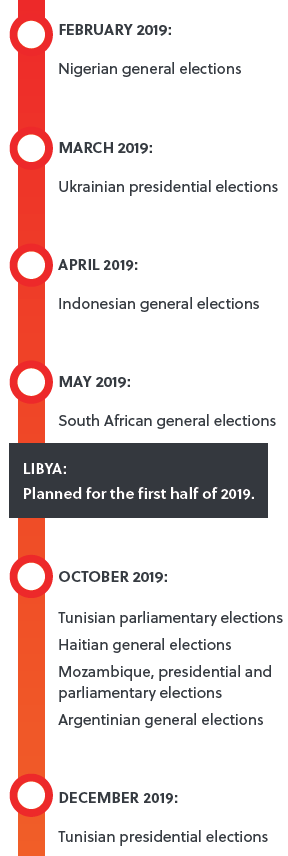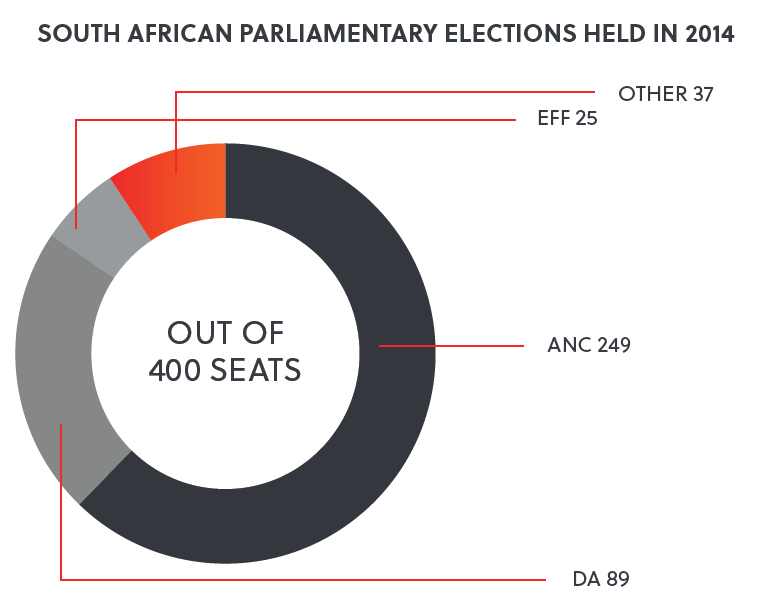2019: Elections to Watch
Much is at stake in 2019 when it comes to scheduled elections. The outcomes will greatly determine the longterm trajectories of many countries, while also shaping regional dynamics. Indonesian elections are likely to take on religious and ethnic tones, while a new Tunisian government may finally ease an ongoing policy paralysis. Similarly, a strong mandate in Haiti will enable the country to regain stability. Whether it is attaining lasting peace in Libya and Ukraine, reinvigorating a struggling economy in Argentina, or helping fight entrenched corruption in South Africa and Nigeria, electoral outcomes may have a marked impact on the fortunes of several countries in 2019 and beyond.

LIBYA
At an international summit in Italy in November 2018, key Libyan leaders and members of the international community agreed to postpone the December 2018 general elections. According to a new UN peace plan for Libya, the poll will instead take place in the first half of 2019, after a national reconciliation conference. However, in the coming months, if major Libyan factions fail to make the necessary compromises to bridge longstanding political divisions, and hundreds of armed militias operating across the country are not dismantled, the election – should it ensue - is highly likely to be marred by intimidation and violence. This could push Libya into further instability. The high threat of terrorist attacks on electoral targets, particularly by Islamic State, presents an additional concern.
TUNISIA
Tunisia’s parliamentary and presidential elections are respectively scheduled for October and December 2019. These are set to be the country’s third democratic elections since the 2010-2011 revolution that ousted long-term ruler, Zine El Abidine Ben Ali. Municipal elections, held in May 2018, saw a turnout below 40 percent, reflecting widespread disillusionment among voters, due to a perceived lack of progress in political and economic reforms, which had been promised by successive governments since the revolution. Political tensions are likely to increase sharply in 2019, primarily driven by internal rifts within President Beji Caid Essebsi’s Nidaa Tounes party, which have led to the resignation of dozens of party leaders since 2016. Additionally, the collapse of the coalition between Nidaa Tounes party and the Ennahda party will further paralyse policy-making, thus reducing the scope for economic reforms to be implemented prior to the elections. The resulting political vacuum and policy drift will frustrate the public, and is likely to lead to increased civil unrest over the coming year.
INDONESIA
Indonesia’s next general election is currently scheduled for 17 April 2019. It will pit the incumbent, President Joko Widodo, or Jokowi, of the Indonesian Democratic Party of Struggle (PDI-P), against former military general Prabowo Subianto, of the Great Indonesia Movement Party, Gerindra. Both sides have been accused of hiring online “buzzers” - individuals using fake social media profiles to amplify political messaging - resulting in increased political polarisation. Additionally, Subianto has established links to Islamist civil society groups in an apparent bid to capitalise on Indonesia’s growing religious intolerance, which has contributed to numerous protests, especially in Jakarta. Issues related to religious identity will, therefore, likely play a prominent role in the election. This has already manifested in attempts by opposition activists and conservative religious figures to undermine Jokowi’s religious credentials, for example, by accusing him of secretly being affiliated with the country’s defunct Communist movement.
UKRAINE
On 31 March 2019, Ukrainians will vote in a presidential election for the first time since President Petro Poroshenko was elected amidst the Ukrainian revolution in 2014. Yulia Tymoshenko, who previously served as Ukraine’s prime minister from 2007 to 2010, is in position to compete with Poroshenko for the presidency. While the election itself is likely to increase tensions between Ukraine’s political factions, should Tymoshenko get elected, this will likely alter the situation in eastern Ukraine. Tymoshenko has repeatedly rejected the incumbent government’s negotiations with pro-Russian separatists in eastern Ukraine, and has urged a new negotiating strategy which positions Russia’s aggression as a violation of the 1994 Budapest Memorandum. The Memorandum emphasised respect for Ukraine’s sovereignty in exchange for Ukraine’s renunciation of nuclear weapons. As such, in the event that Tymoshenko succeeds in her presidential bid, heightened tensions between Ukraine’s armed forces and Russian-backed separatists in eastern Ukraine will likely amplify the threat of war between Ukraine and Russia

SOUTH AFRICA
In May 2019 South Africa will hold its sixth post-Apartheid general election. The three leading parties in the election will be the African National Congress (ANC) led by incumbent President Cyril Ramaphosa, the opposition Democratic Alliance (DA) led by Mmusi Maimane and the Economic Freedom Fighters, EFF, led by Julius Malema. The ANC’s policies sit across the political spectrum, while the DA remains largely centre-right, compared to the EFF, which espouses more radical social and economic policies. In the parliamentary elections held in 2014, the ANC won 249, the DA 89, and the EFF 25 seats out of 400. Under the proportional representation electoral system, six other parties won the remaining seats. Should he do well at the polls, President Cyril Ramaphosa is aiming to consolidate his authority within his party, after narrowly being elected as the ANC’s leader following former President Jacob Zuma’s resignation on 14 February 2018. Nevertheless, although the ANC is likely to once again win the elections, its majority may be further reduced, with gains for both the EFF and the DA. However, there is also a low likelihood that the elections will usher in a coalition government for the first time in South Africa’s history as, should the ANC fail to receive 50 percent of the vote, it may have to form a coalition with either the EFF or the DA, with the former a more likely partner than the latter. Short of a convincing ANC victory, the South Africa’s political landscape will present considerable uncertainty in the aftermath of the 2019 elections.
NIGERIA
Nigeria’s presidential elections are set to take place on 16 February 2019. Incumbent President Muhammadu Buhari will once again be representing his ruling All Progressives Congress (APC) party. However, President Buhari has been beset by ill health, while his administration has faced criticism over its handling of the economy. Both issues are likely to favour his main challenger, Atiku Abubakar, the representative for the People’s Democratic Party (PDP). Abubakar, himself a former member of the APC, was part of a long line of defectors from a party seemingly losing steam. However, party loyalties in Nigeria are complex and fluid, making it far from certain which party will succeed in winning the majority of votes. An Abubakar victory is likely to place less emphasis on the fight against corruption, compared to Buhari, as Abubakar was himself involved in a US anti-corruption investigation more than a decade ago. However, given his past business credentials and his history in the oil sector, he is likely to attract more foreign investment than a second Buhari term. Abubakar has already announced his intentions to privatise at least 90 percent of the Nigerian National Petroleum Corporation. Whoever wins the election will be forced to address religious and ethnic conflict in the central regions of the country, continuing unrest in the Niger Delta, and an undefeated Boko Haram insurgency in the North.
MOZAMBIQUE
Mozambique will hold its sixth presidential, parliamentary and provincial elections on 15 October 2019. The ruling party, Mozambique Liberation Front (FRELIMO), is likely to win the elections. However, opposition party, the Mozambican National Resistance (RENAMO), has seen growing support in the northern and southern parts of Mozambique. Political tensions in Mozambique remain high, although FRELIMO and RENAMO are close to negotiating a definitive peace deal to officially end the low-level RENAMO insurgency, which began in October 2012 and saw a ceasefire in May 2017. A combination of hidden government debt amounting to USD 2 billion, an incipient Islamic militant insurgency in northern Mozambique, and claims of corruption and cronyism amongst the FRELIMO ranks will work in RENAMO’s favour in the upcoming poll. Mozambican elections have previously been criticised for extensive electoral malpractices by FRELIMO, including election fraud and intimidation of RENAMO members in central and northern parts of the country. Potential electoral malpractices in the 2019 elections threaten peace negotiations, fomenting fears of a renewed RENAMO insurgency.
HAITI
In October 2019, Haiti is expected to hold both parliamentary and local municipal elections. The main contenders will be the current ruling Parti Haïtien Tèt Kale (Hatian Bald Headed Party, PHTK), which also holds a majority in both the Lower House and Senate, and the opposition Lavalas Family Party and the Pèp Kap Lité Organisation. The political environment in the country has remained unstable with regular anti-government and anti-corruption protests, particularly in the capital, Port-au-Prince. The apex of political instability in 2018 occurred over three days following a government attempt to increase fuel prices on 6 July 2018. Widespread anti-corruption protests also took place in early November 2018, with several people shot in violent confrontations with security forces across the country. Further civil unrest is likely in the lead up to elections, and precedent suggests these can escalate into violent confrontations with security forces and acts of localised malicious damage.
ARGENTINA
On 27 October 2019, Argentina is scheduled to vote for a new president, members of the national congress, and governors of the majority of provinces. Currently, the government of Maurício Macri faces increasing citizen opposition to an unpopular International Monitory Fund bailout, and associated stringent austerity measures put in place in Argentina. With the sanctioning of his austerity bill by the senate, Macri confirmed he would be running for re-election in 2019. As such, widespread political protests by left-wing groups and other members of the public opposed to his economic policies will likely continue in cities such as Buenos Aires, Rosario and Mendoza in the run-up to the election.
